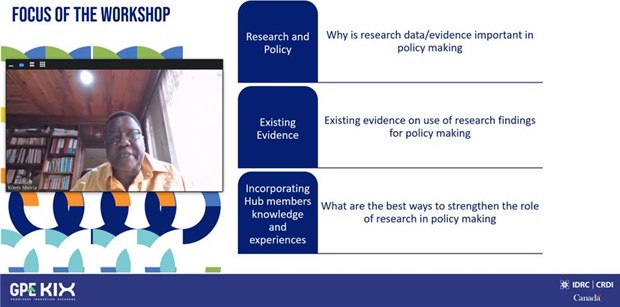
“The real challenge is to balance qualitative and quantitative data. We need quantitative data on enrolments and budgets, but we also need qualitative data that address why some principals perform better than others,” said Dr. Kilemi Mwiria, as he led a three-session workshop for policymakers on employing research and innovation for evidence-based education sector policies and practices. The workshop series was organised by the Global Partnership for Education Knowledge and Innovation Exchange (KIX) Africa 19 hub and held from April 28th to May 12th, 2022.
Dr. Mwiria, former Assistant Minister of Education of Kenya, was responding to a participating policymaker’s question on how to reconcile the need for qualitative and quantitative data to drive policy. Over the course of the workshop, he provided practical insight on translating research into policy formulation and implementation. The workshops aimed to strengthen the capacity of policymakers to effectively identify knowledge gaps in their education systems and to discuss the importance of research in policymaking. More than 40 education stakeholders participated, representing the KIX Africa 19 countries of Ethiopia, Lesotho, Liberia, Kenya, Malawi, Nigeria, Rwanda, Sierra Leone, Somalia, Tanzania, Zambia, and Zimbabwe.
In the first session, Dr. Kilemi shared the experience of the Task Force on Harmonisation of Secondary School Fees in Kenya during 2014. He discussed the research process, findings, and recommendations of implementing free secondary education which the government enacted in 2019. The second session focused on the process of converting research findings into policy and examined policy formulation, implementation, evaluation, and succession. The third and final session featured a case study from Zambia. Lola Kaniki, Senior Education Officer from Zambia, presented research on teaching and learning amidst the COVID-19 pandemic that helped “provide policymakers and sector practitioners with evidence to inform planning and policy implementation for improved service delivery”.
During discussions, a participant from Malawi insightfully shared the importance of research dissemination in addition to knowledge production noting "If one could not access the data” the research may be duplicated or ignored; however, “if data is made available for all it would be easier to make use of it.”
For more information on the activities of the KIX Africa 19 hub, please visit our website housed on UNESCO IICBA’s website, and visit our digital repository to access more than two hundred national and regional policies, research, and resources on teaching and learning, assessment, early childhood education, gender equity and inclusion, and the data challenge in education.
